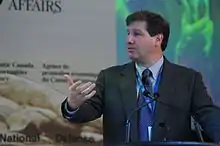Gideon Rose
Gideon Rose is the editor of Foreign Affairs, and a member of the Council on Foreign Relations. He served as Associate Director for Near East and South Asian Affairs on the staff of the National Security Council from 1994 to 1995 under the Clinton Administration.[1]
Gideon G. Rose | |
|---|---|
 Gideon Rose at the Halifax International Security Forum 2012 | |
| Born | 1963 (age 57–58) |
| Nationality | United States |
| Education | B.A. Yale University Ph.D. Harvard University |
| Occupation | Political and economic commentator |
| Known for | Editor of Foreign Affairs |
| Parent(s) | Joanna Semel Rose Daniel Rose |
| Family | Frederick P. Rose (uncle) Jonathan F.P. Rose (cousin) David S. Rose (brother) Amy Rose Silverman (cousin) |
Early life and education
Rose was born to a Jewish family, the son of Joanna (née Semel)[2] and Daniel Rose, a real estate developer.[3] In 1985 he earned a B.A. in Classics from Yale University, where he was a member of Scroll and Key.[4] He received his Ph.D. in government from Harvard University in 1994.
Career
In 1985 Rose was appointed assistant editor of The National Interest, a foreign policy quarterly.[5] He then went on to hold a similar position at a domestic quarterly called The Public Interest.[6] He served as Associate Director for Near East and South Asian Affairs on the staff of the National Security Council from 1994 to 1995 under the Clinton Administration.
In 1996 he joined Princeton University's Politics Department as a lecturer on American foreign policy, before holding a similar position at the School of International and Public Affairs (SIPA) at Columbia University.
Rose was an Olin Senior Fellow and the Deputy Director of National Security Studies at the Council on Foreign Relations from 1995 to 2000,[7] before he was appointed managing editor of Foreign Affairs to replace Fareed Zakaria.[6] On June 3, 2010, it was announced that Rose would be succeeding James F. Hoge, Jr. as the editor of Foreign Affairs. He took up the position on October 1, 2010.[8]
Works
- A New U.S. Policy Toward India and Pakistan (1997), with Richard N. Haass
- How Did This Happen?: Terrorism and the New War (2001), edited with James F. Hoge, Jr.
- The Rise of China (2002), edited with James F. Hoge, Jr.
- The War on Terror (2002), edited with James F. Hoge, Jr.
- The Middle East in Crisis (2002), edited with James F. Hoge, Jr.
- America and the World: Debating the New Shape of International Politics (2003), edited with James F. Hoge, Jr.
- American Foreign Policy: Cases and (2003), with James F. Hoge, Jr.
- Understanding the War on Terror (2005), with James F. Hoge, Jr.[9]
- How Wars End: Why We Always Fight the Last Battle (2010)
- Among Nations: Readings in International Relations (2010), editor
- The New Arab Revolt: What Happened, What It Means, and What Comes Next
- The Clash of Ideas: The Ideological Battles that Made the Modern World - And Will Shape the Future (2011), with Jonathan Tepperman
- The U.S. vs. Al Qaeda: A History of the War on Terror (2011), edited with Jonathan Tepperman
- "Making Modernity Work; The Reconciliation of Capitalism and Democracy", Foreign Affairs (January/February 2012)
References
- Notes
- "Gideon Rose". Bloomberg Link. Archived from the original on 30 January 2013. Retrieved 15 August 2013.
- New York Times: "WEDDING IS HELD FOR JOANNA SEMEL; Graduate of Bryn Mawr Is Bride of Daniel Rose, a Veteran of Air Force" September 17, 1956
- New York Observer: "The Rose Family" By Jason Horowitz December 18, 2006
- Mangino, Andrew (14 February 2006). "Trustee Zakaria '86 Found His Niche at Yale". Yale Daily News. Retrieved 15 August 2013.
- Speakers Profiles- Arab Strategy Forum 2004
- Foreign Affairs Announces the Appointment of Gideon Rose as Managing Editor - Council on Foreign Relations
- Gideon Rose - Council on Foreign Relations
- CFR Board of Directors Appoints Gideon Rose Next Editor of Foreign Affairs
- https://www.cfr.org/book/understanding-war-terror-foreign-affairs-books